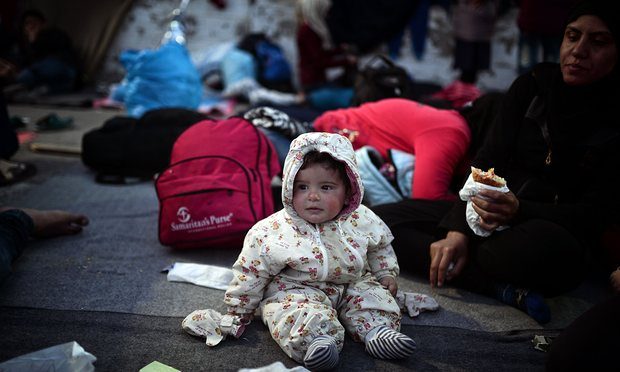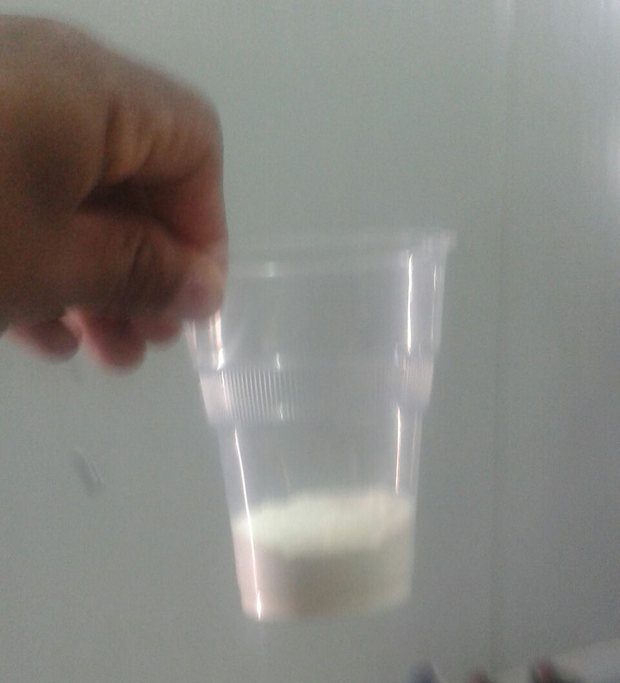Refugee babies held on Greek island lacking sufficient milk
Asylum seekers being held in detention centre allege babies under six months old are being given just 100ml of milk a day

Babies detained in Greece under the terms of the EU-Turkey migration deal are being denied access to adequate supplies of milk formula, refugees and aid workers have alleged.
Approximately 25 babies under the age of six months, whose mothers are unable to breastfeed, are being given roughly 100ml of milk formula just once a day on the island of Chios, according to photographs sent by detained refugees and testimonies provided by phone.
Britain’s Royal College of Midwives said the situation, if confirmed, would contravene international protocol, and suggested that some refugee babies in Greece may be receiving just a quarter of their recommended daily intake.

The situation is the result of the EU-Turkey migration deal, which has forced under-resourced officials on the Greek islands to detain all asylum-seekers landing on their shores from Turkey. In previous months, hundreds of thousands of asylum-seekers were allowed to move onwards towards northern Europe.
Since the deal came into effect on 20 March more than 6,000 people have been held on Greek islands, shortly after their arrival, in conditions that Amnesty International and Human Rights Watch have described as appalling. Some 1,100 are trapped inside the Vial camp on Chios, roughly 40% of them children.
European countries promised to provide hundreds of asylum officials to help Greece care for the detainees, but most of this support has yet to arrive.
A 35-year-old Afghan construction manager, detained in a detention centre on Chios since 21 March, said he had been forced to mix water with bread to stop his five-month-old daughter going hungry.
The man, who said he worked as a contractor for the British army in Afghanistanbut asked not to named for fear of victimisation, said: “They are only giving us half a cup of milk for all 24 hours – but that’s not enough. There’s no more milk for lunch or dinner or during the night. This is a big problem. There are maybe 24 or 25 babies under six months.”
The Norwegian Refugee Council, which maintains a presence on Chios, confirmed the claim and said the number of infant children may even be higher. “It’s clear that baby milk [formula] is not being routinely distributed,” said Dan Riley, the NRC’s protection and advocacy officer on Chios. “I did a series of meetings with refugees last week, and mothers brought up [the issue of] baby milk all the time.
“But it stems beyond baby milk: there is a lack of basic care for children. There is a hygiene crisis. Infant children are sleeping in highly inappropriate arrangements, on the floor … It’s absolutely a baby-unfriendly environment.”
Riley added that many mothers said they could not breastfeed due to the stress of the situation.

Asked to comment on the amount of baby formula allegedly provided to refugee mothers on Chios, a spokeswoman for the Royal College of Midwives said the distribution contravened international guidelines.
Janet Fyle, an RCM midwife adviser, stressed that according to World Health Organisation (WHO) protocol, mothers in emergency situations such as on Chios should be encouraged to breastfeed their children.
Infants should be given milk formula only as a last resort, in cases where mothers are unable to breastfeed. But in cases where it is necessary, it needs to be administered several times a day, and in quantities in excess of 100ml, Fyle added.
Fyle said: “You cannot give them a cup of milk once a day that will not be fit for consumption after several hours.”
Fyle continued: “If the child is under six months, the child needs to fed 80 to 100ml [of formula] every three or four hours. If it is a newborn baby, it needs to be 30 or 40ml [of formula] every three to four hours. Otherwise the child will get dehydrated, and possibly get jaundice.”
She added: “In the UK, we can no longer detain children for immigration purposes. So one of the questions we are asking is: how can you detain babies [in Greece] and then only give them 100ml a day?”
The Afghan construction manager said his daughter was in a constant state of distress as a result of the lack of milk. “She is crying always,” he said by phone. “She just wants milk, but [instead] she has stomach pain.”
He said he had been forced to come to Europe after being threatened with assassination by the Taliban for his work with western countries. He added that he had carried out contracted construction work for British, American and Italian forces over a number of years, and sent the Guardian copies of his contracts, and photographs of himself with British and Italian officers, to support his claim.
“I had everything in Afghanistan – a house, a car,” he said. “But when you work with foreigners in Afghanistan, you cannot live there safely. At the end of the year that has passed, I had a warning from Taliban. They wrote on my wall: ‘You are working with foreigners, wait for death.’ They came back on a motorcycle and shot at me and it missed.”
Now in Europe, he says he is not being treated with the dignity he deserves. “They are not treating us like a humans – when I ask what is happening, they just say: ‘go back’, nothing else. This is not a camp, it is a prison.”
Contacted by the Guardian, an official at the Chios police headquarters did not deny the allegations, and said he would pass on concerns to the chief of the police on the island.
The milk situation is the latest controversy to arise from both the EU-Turkey deal, and the Chios camp.
Officials at the Chios council say that the camp should not be used as a detention centre. It was leased to the central government in January for use as an open detention centre, and the Chios mayor and his colleagues say its new designation as a detention centre is therefore illegal.
“When the camp became a prison, this was against the contract because the contract said it was supposed to be an open detention centre,” said Ermioni Frezouli, a local councillor.
In a separate development, a Human Rights Watch report alleged on Tuesday that several people deported from the camp in recent weeks had been sent to Turkey without personal belongings including medication, identification documents, and clothes.
[su_note note_color=”#fefccb”]The views expressed in this article are the author’s own and do not necessarily reflect Libyan News’s editorial policy.[/su_note]
How to submit an Op-Ed: Libyan Express accepts opinion articles on a wide range of topics. Submissions may be sent to oped@libyanexpress.com. Please include ‘Op-Ed’ in the subject line.
- Libyan MP cautions new UN envoy over approach - January 27, 2025
- Oil expert criticises Libya’s public sector hiring freeze - January 27, 2025
- Trump proposes Gaza population transfer plan - January 27, 2025


